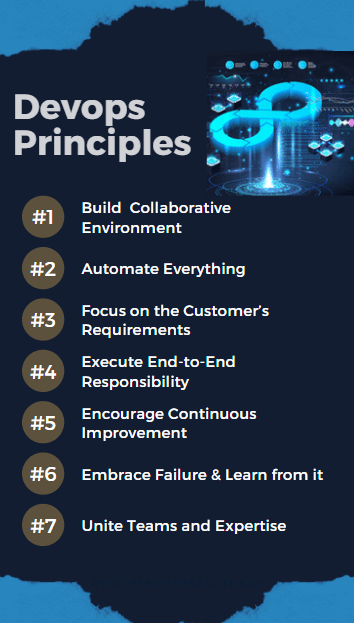Software development is a complicated process with many tasks that are often repetitive yet requires a high level of precision. These tasks are carried out by professionals having knowledge of the software including its development, operational uses, and relevance to the business objectives. A DevOps Professional is responsible for the software development and integration process that meets the requirement of the business enterprise as well.
Building a DevOps culture in the organization has many proven benefits. These benefits include faster software development and integration, frequent software releases, reduction in costs, and speedy delivery. As more and more enterprises start adopting DevOps in their business model, the demand for qualified and experienced professionals with training and certification in DevOps has increased a lot in recent years.
Jump ahead to
What is DevOps?

The term DevOps is a combination of software development (Dev) and operations (Ops). It is a practice or culture of collaboration between software development and operations teams that aims to deliver high-quality software to meet the business requirements. DevOps emphasizes the need for effective communication among the people responsible for the software development and integration process.
Developed in the late 2000s, this IT practice adopted heavily from the agile practices and lean thinking approach along with systematic automation. The DevOps culture changed the software development methodology with its efficient and effective model of combining the engineering department that creates the code and the IT department that adopts it in the business. This led to greater success in software integration and faster product releases.
Advantages of DevOps
Before the introduction of the DevOps software development methodology, the engineering and the IT department worked separately. The software engineers worked on developing the code and the IT teams operated to keep the applications working. Though they worked towards a common objective, their paths rarely crossed. This created confusion and failed deliveries resulting in a waste of valuable resources for the business. The lack of an effective communication channel between the two teams impacted the business goals as well.
The DevOps methodology was developed to rectify these problems. Automating the software development process resulted in increased collaboration between the software engineering teams and the IT operations teams. The practice enabled teams to create, test, and implement software at a faster rate with minimum discrepancies. The continuous delivery approach of DevOps helps business enterprises in the speedy release of the product, better feedback cycle, and fixing glitches or bugs in the system at an early stage. This prevents loss of essential business resources and helps the enterprise attain its goals, effectively.
7 Key DevOps Principles
To create a DevOps environment, every member must be aware of the key principles of DevOps. These principles serve as guidelines for the implementation of the DevOps software development methodology in the organization. Here are the 7 key principles of DevOps that help organizations build a DevOps culture:
- Build a Collaborative Environment
The main objective of the DevOps culture is to create an environment of collaboration between the software development teams and the operations integration teams. Both the teams have separate functional areas, however, they share a common goal. Thus, it is important that they frequently communicate with each other sharing ideas, strategies, and plans to achieve the business objectives.
- Automate Everything
Automation is one of the essential components of DevOps. It helps in streamlining the business process and leads to faster product delivery. Software development including frequent testing and fixing bugs becomes easier with automation. This also helps enterprises release products that are safer and reliable compared to the traditional software development methodology.
- Focus on the Customer’s Requirements
DevOps focuses on the requirements of the customers as the success of the product depends on how effectively it serves the purpose for which it was created. This helps the organization to create products that fulfill their client’s needs. Automating the business processes through DevOps helps in receiving valuable feedback from the customers which in turn helps in improving the software development process.
- Execute End-to-End Responsibility
In a DevOps environment, the software development and operations teams share the responsibility of executing the application from its initial planning stage to the finished product. This helps in decreasing the problems resulting from inefficient communication between the two teams and produces effective results.
- Encourage Continuous Improvement
DevOps encourages a culture of continuous improvement. Adapted from Lean, this ensures that the customers receive products that are in accordance with the changing environment. Continuously improving the performance, accuracy, and speed of the product helps meet the customer’s requirements. Thus, attaining the organizational objectives.
- Embrace Failure and Learn from it
Though DevOps focuses on minimizing the rate of failure, embracing them should not become a challenge. Negative feedback or product failures can be used to learn about the shortcomings. This will help in improving the business process and releasing products that have a higher success rate.
- Unite Teams and Expertise
Collaborating and communicating with teams having different expertise is vital. DevOps unites the software engineers that specialize in coding with the operations teams who implement the application. It helps in creating a cross-functional team where each member has a specific skill set and is aware of their roles.
Adopting the DevOps culture has made enterprises better at releasing software in a fast, safe, and reliable way. The future of DevOps is bright with more involvement of software development teams in the critical decision-making processes that will impact the productivity of the business. With Cloud Computing and Digitalization taking over the world economy, having the skillset and knowledge in DevOps can become very valuable for individuals interested in starting their career in the IT sector.
Conclusion
Identifying areas where there is a lag of communication, automation of the business processes, and promotion of greater collaboration between the business, software, and operations teams are some of the best advantages of the DevOps software development methodology. Through DevOps, organizations can make their business processes more transparent and increase efficiency. However, organizations who are thinking about adopting the DevOps culture must fully commit to the idea and understand that it is a long process.


